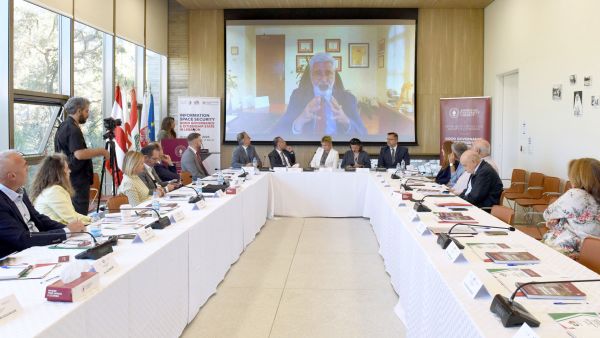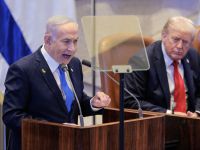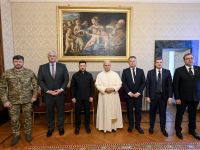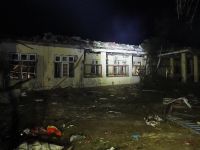AUB, Civic Influence Hub, and INFO OPS Poland Foundation Convene Lebanese–Polish Consultation on Information Space Security, Good Governance, and Citizenship

The American University of Beirut (AUB) hosted two days of the Lebanese–Polish consultation on “Information Space Security, Good Governance, and the Citizenship State in Lebanon,” an initiative by the Civic Influence Hub (CIH) and the INFO OPS Poland Foundation, organized in collaboration with the Good Governance and Citizenship Observatory (GGCO) at the Asfari Institute for Civil Society and Citizenship at AUB.
Lina Abou Habib, director of the Asfari Institute for Civil Society and Citizenship at AUB, welcomed participants and acknowledged the support of the Civic Influence Hub and the Polish Embassy in Lebanon in fostering this joint initiative. She highlighted that since the launch of the Good Governance and Citizenship Observatory at the Asfari Institute, the long-standing partnership with the Civic Influence Hub had marked “the start of deep conversations on the Lebanon that we would like to see, the Lebanon that we would like to build together. The conversation around equality, democracy, relationships between people living in this country, relationships that mirror a democratic pluralistic society, a society where people have the freedom to think, and the freedom to talk, and the freedom to organize.”
Dr. Ziad El Sayegh, Civic Influence Hub executive director, also delivered his welcome address and said, “We are honored to partner with the INFO OPS and the American University of Beirut through the Good Governance and Citizenship Observatory at the Asfari Institute for Civil Society and Citizenship, whose academic excellence provides an invaluable foundation for our work. Together, we hope to open new avenues for civic, academic, and international collaboration in support of Lebanon’s path toward a sovereign, just, democratic, and citizenship state.”
H.E. Aleksandra Bukowska–McCabe, ambassador of Poland to Lebanon, delivered her opening remarks and said, “It seems to me that Poland and Lebanon have a lot in common. We have both suffered at the hands of our neighbors. And in Poland, we also know what it means to be occupied. But what is clear to all, is that this is an important period of transformation in Lebanon. And this is something that we also know about in Poland.”
She went on to speak about Poland’s struggles and transformation throughout history, noting that these experiences “taught us that sovereignty, independence, and the rule of law are precious things that need to be fought for and protected. But they also come from within, from the country's citizens.”
Elias Houayek, member of the CIH Board of Directors, also spoke at the opening session, noting, “We meet at a moment of profound importance. Lebanon, like many countries, is navigating challenges to its sovereignty, its constitution, its institutions, and its civic life. In this context, the security of our information space becomes a matter of national resilience.”
He added, “Disinformation, influence operations, and manipulated narratives not only weaken democratic processes but also erode trust between citizens and the state. Addressing these challenges requires dialogue, research, and above all, constructive and
sustainable partnership.”
Dr. Witold Repetowicz, assistant professor at the War Studies University, delivered the opening address on behalf of Kamil Basaj, president of the INFO OPS Poland Foundation. In his remarks, he highlighted that “our aim today is to delve into Polish–Lebanese relations. A relationship of two countries, that despite being separated by geography, share many similarities. One of the most important features in this regard is the commitment of both nations to democracy, freedom, and justice. Today, the security of the information environment is not merely a technical issue. It is the very foundation upon which modern democracy, individual freedoms, and the prosperity of nations are built. An open and secure information space allows for informed public discourse, holds institutions accountable, and fosters trust. Conversely, when it is compromised by disinformation and hostile influences, it erodes social cohesion and paralyzes democratic processes.”
In a recorded message, Dr. Fadlo Khuri, AUB president, highlighted parallels between Lebanon and Poland—both having faced repeated challenges to sovereignty, cultural identity, and democratic aspirations—stating, “both persevered, driven by a commitment to freedom, justice, diversity, and the rule of law.” He noted that this commitment “lives in the civic DNA of our societies, and in the principles of inclusive citizenship, that we seek to protect and promote today.”
Khuri went on to highlight that in a region marked by persistent instability and rapidly shifting alliances, the information space—once a beacon of enlightenment—has “increasingly become a battleground for influence operations, propaganda, and disinformation. The consequences are real, tangible, and deeply felt in Lebanon and beyond.” He stated that “we at AUB believe that robust collaboration between academia and civil society, the private sector, and public institutions is essential to building an informed and resilient society. The information space cannot be left to chance or to manipulation. It must be shaped proactively—grounded in accurate data, independent research, and a shared commitment to truth and accountability.”
The consultation included several panels. “Lebanon’s Information Environment and Influence Operations” was presented by Dr. Witold Repetowicz and Maksym Sijer, analyst and lecturer at the INFO OPS Poland Foundation; and moderated by Dr. Ziad El Sayegh. “Civil Society in Lebanon: Concept of Citizenship and Good Governance” brought together Lina Abou Habib and Dr. Fady Rahme, member of the CIH Board of Directors, and was moderated by Dr. Tania Haddad, director of the Global Engagement Initiative at AUB. “Imperialism and Colonialism: Narratives and Realities, West–East Cooperation” featured contributions from Dr. Bashshar Haydar, professor of philosophy at AUB, and Dr. Ziad El Sayegh, under the moderation of Dr. Simon Kachar, founding and current director of GGCO and lecturer in political science at AUB. Closing remarks on the first day were delivered by Dr. Repetowicz, Dr. El Sayegh, and Dr. Kachar.
The second day addressed “Lebanon Society: Psychological Resilience and Vulnerabilities,” with panelists Dr. Brigitte Khoury, professor and clinical psychologist at AUB, and retired General Ziad El Hachem. The session was moderated by Dr. Ziad El Sayegh and Dr. Simon Kachar. The day’s program concluded with working groups and a session on “Conclusions and Perspectives,” presented by Dr. Repetowicz, Dr. El Sayegh, and Dr. Kachar.
A third consultation day was held at Haigazian University. The opening remarks were presented by H.E. Aleksandra Bukowska–McCabe, ambassador of Poland to Lebanon, and Rev. Dr. Paul Haidostian, president of Haigazian University; followed by a lecture by Dr. Witold Repetowicz, Dr. Ziad El Sayegh, and Dr. Joseph Alagha, moderated by Rev. Dr. Wilbert van Saane.
Background Information
American University of Beirut
Founded in 1866, the American University of Beirut is a teaching-centered research university based on the American liberal arts model of higher education. AUB has over 9,000 students and over 1,200 instructional faculty members. The University encourages freedom of thought and expression and seeks to graduate men and women committed to creative and critical thinking, lifelong learning, personal integrity, civic responsibility, and leadership.






